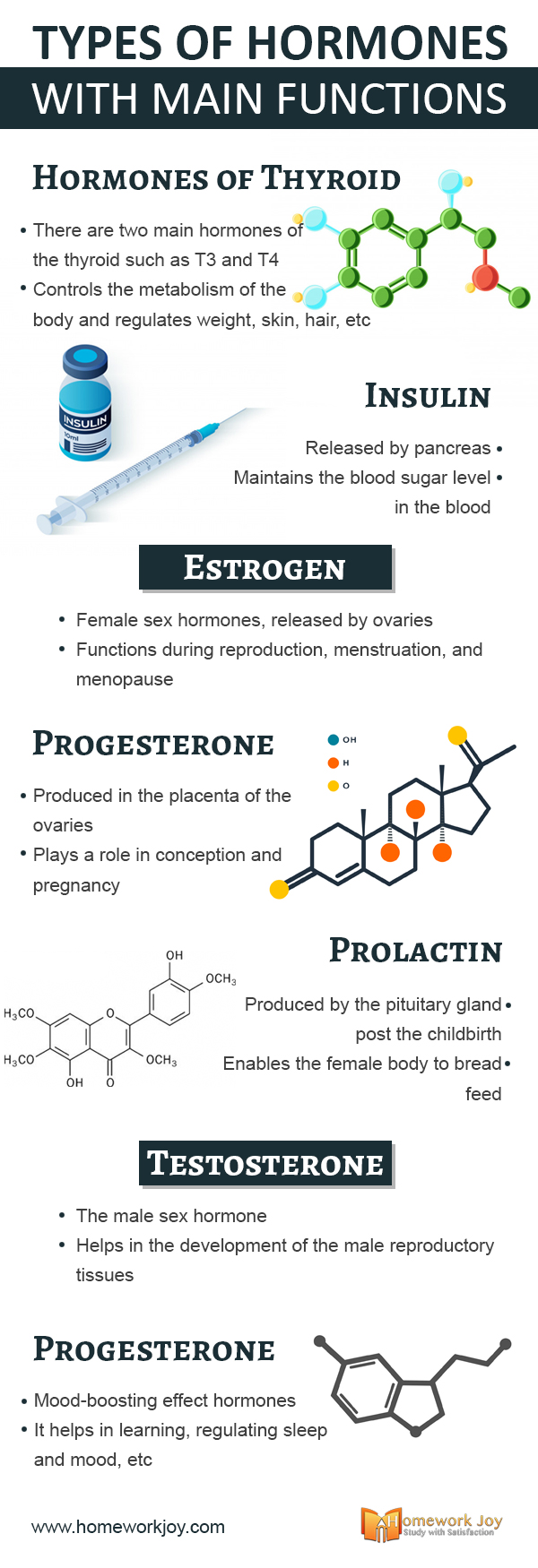The human body comprises of various types of hormones that act as chemical messengers transported via blood throughout the body. The process of transport of hormones throughout the body is known as endocrine secretion. These hormones serve many functions by providing steady effects such as:
- Growth and development
- Increases metabolism of the body
- Helps in reproduction
- Alters mood
- Sexual impulses
Hormones regulate psychological activities and maintain homeostasis. Here is a brief account of the types of hormones found in the human body with their specific functions.
Hormones of Thyroid
This type of hormones is secreted in the thyroid gland located in front of the adam’s apple in the neck. The main purpose of the hormones of the thyroid is to regulate the body’s metabolic rate, controls heart muscle, and initiates brain development. The cells of the thyroid gland have the tendency of extracting iodine from the blood and incorporating it with the thyroid hormones.
There are two main hormones of the thyroid such as T3 and T4
Controls the metabolism of the body and regulates weight, skin, hair, etc
Insulin
Insulin is a type of hormone released by the pancreas. The prime task of this hormone helps the body in using sugar from the stored carbohydrates in the food that we consume or store it for future purposes. It also keeps the blood sugar level balanced by not letting it rise too high or too low from the ideal level. The insulin is released after consuming food when the blood sugar level rises and cells in the pancreas signals to release insulin into the bloodstream.
Estrogen
Estrogen is a female sex hormone, released by ovaries that help in the development and maintenance of their reproductive system. Also, they initiate the growth of female breasts and pubic hair. Added to that, they also help in contributing to the bone and cognitive health, alters the functions of the cardiovascular system, and looks into the bodily processes. There are various types of estrogens, including, Estrone, Estradiol, and Estriol.
Progesterone
Progesterone is produced in the placenta of the ovaries. They play a role in conception and pregnancy. The excessive alteration of progesterone in the female body can cause abnormal menstrual periods. To get the right implantation of the fertilized egg in the uterus during pregnancy, the release of the progesterone is necessary.
Prolactin
Prolactin is produced by the pituitary gland post-childbirth. It is the hormone that manages the release of milk from the breast of the female body that she uses to suckle her kids.
Testosterone
The male sex hormone responsible for the growth of hair on the chest and for the male sex drive. It helps in the development of the male reproductory tissues, in building the man’s muscles, and to make him physically receptive.
Serotonin
Serotonin is the mood-boosting affects hormones, which helps in learning, regulating sleep and mood, etc. It is also the chemical messenger that is called a neurotransmitter that acts on the blood vessels and the pain controlling channels of the brain. It makes us in controlling our attention, sleep, and pain.
Cortisol
Cortisol is produced by the adrenal gland that the body releases when you’re under stress. It controls physical and psychological stress. It is made of the two adrenal glands that sit on the top of the kidneys. It plays a key role in the breakdown of carbohydrates, lipids, and proteins.
Adrenaline
The adrenaline Secrets in the medulla in the adrenal gland to increase the metabolic rate, dilate the blood vessels, etc.
Growth Hormone
The growth hormone is secreted by somatotrophs present in the pituitary, which stimulates growth and boosts metabolism.
If you need more help related to similar topics, take instant online homework help from our professors.
